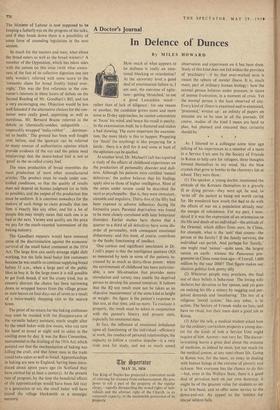A Doctor's Journal
In Defence of Dunces
By MILES HOWARD How much of what appears to be dullness is really an emo- tional blocking or retardation? At the' university level a good deal of examination failure is, I am sure, the outcome of agita- tion—getting `thrutched,' to use a good Lancashire word— rather than of lack of diligence : for one reason or another, the candidate grows more and more tense as D-day approaches, he cannot concentrate or 'focus' his mind, and hence his recall is patchy. In the examination itself, he is flustered and makes a bad showing. The more important the examina- tion, the more likely is this to happen. Preparing for 'finals' (in anything) is like preparing for a battle : there is a drill for it and some at least of the agitation can be quelled.
At another level, Dr. Michael Craft has reported a study of the effects of childhood experiences on the production of personality disorder and dull- .ness. Although his patients were certified 'mental defectives,' the author believes that his findings apply also-to those of higher intelligence. Most of the series under review could be described (he says) as psychopaths: that is, they were immature, unstable and impulsive. Thirty-five of the fifty had been exposed to adverse influences during the formative years. Parental deprivation was found to be most closely correlated with later behaviour disorders. Earlier studies have shown that a quarter to a third of all defectives have some dis- order of personality, with consequent emotional disharmony; and this must, of course, contribute to the faulty functioning of intellect.
One curious and significant conclusion in Dr. Craft's paper is that the intelligence quotient (IQ) as measured by tests in some of the patients in- creased by as much as thirty-three points : when the environment of childhood has been unfavour- able, a new life-situation that provides more stimulation and variety may enable the deprived person to develop his unused resources. It follows that the IQ test result must not be taken as an objective 'measurement' of the same kind as height or weight : the figure is the patient's response to that test, at that time, and no more. To evaluate it properly, the result must be taken in conjunction with the patient's history and present state, especially his emotional state.
In fact, the influence of emotional imbalance upon all functioning of the individual—efficiency at work, the conduct-of personal relationships, the capacity to follow a creative impulse—is a very wide area for study, and not so much sound observation and experiment on it has been done. Study of this kind does not fall within the province of 'psychiatry—if by that over-worked term is meant the sphere of mental illness. It is, much more, part of ordinary human biology : how the normal person behaves under pressure, in states of intense frustration, in a moment of crisis. Yet the normal person is the least observed of any. Every kind of illness is examined and re-examined, 'processed,' written up : an infinity of papers on minutiie are to be seen in all the journals. Of course, studies of the kind I mean are hard to plan, but planned and executed they certainly should be.
As I listened to a colleague some time ago talking of his experiences as a member of a team in a Service Unit sent by the Society of Friends to Korea to help care for refugees, three thoughts formed themselves in my mind, like the blue crystals that grew in bottles in the chemistry lab at school. They were these : (I) The speaker, a young doctor, mentioned the attitude of the Koreans themselves to a gravely ill or dying person—they were apt, he said, to 'write off' the patient as being not worth caring for. He wondered how much this had to do with the effects of war on a population already near the margin of subsistence. For my part, I won- dered if it was the expression of an orientation to the life and death of an individual—the attitude of the Oriental, which differs from ours. In China, for example, what is the 'unit' that counts—the person or the family? If the family survives, the individual can perish. And perhaps for 'family,' one might read 'nation'—quite soon, the largest nation on earth : witness the Panorama pro- gramme on China some time ago—if I recall, 1.600 million by the year 2000? That figure makes our election politics look pretty silly.
(2) Whatever people may proclaim, the linal test of their beliefs is behaviour The loving wife declares her devotion to her spouse, and yet goes on making his life a misery by nagging and per- petual demands and 'smothering.' The test of a religious 'moral system,' like any other, is in action. The Society of Friends make no fuss, and have no ritual, but their team does a good job in Korea.
(3) After the talk, a medical student asked how far the ordinary curriculum prepares a young doc- tor for the kinds of task a Service Unit might require of him. Answer—not very far. The doctor- in-training learns a great deal about the minutile of medicine, as indeed he must, but not much (in the medical course, at any rate) about life. Going to Korea was, for the team, an essay in dealing with human beings at the extreme of poverty and sickness. Not everyone has the chance to do this —but, even in the Welfare State, there is a good deal of privation here on our own doorstep; it might be of the greatest value for students to see it at first hand, and to offer some service to the down-and-out. An appeal to the 'instinct for rescue' seldom fails.














































 Previous page
Previous page